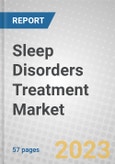In this report, the market has been segmented based on product type, medication type, and geography. The report provides an overview of the global sleep disorders treatment market and analyzes market trends. Using 2021 as the base year, the report provides estimated market data for the forecast period, 2022-2027. The scope of the report includes pharmaceutical sales and anxiolytic consumption, as well as hypnotics and sedative consumption, non-mental health related disorders, and all other types of medications that aid in improving sleep quality.
The report covers the market for sleep disorders treatment across different regions. It also highlights major trends and challenges that affect the market and the vendor landscape. The report estimates the global market for Sleep Disorder Treatments in 2021 and provides projections for the expected market size through 2027.
Different types of drugs are used to treat insomnia, sleep apnea, and other sleep disorder problems. Additionally, the report discusses the different medication types used to treat sleep disorders. This report does not include any therapeutic devices used for treating patients. Medications generally help induce sleep by inhibiting central nervous system activity. Sleeping tablets are routinely used to treat insomnia. The impact of sleep drugs depends on their chemical composition. The growing product approval for sleep drugs is another reason for conducting this market study.
Report Includes
- 14 data tables and 14 additional tables
- An updated overview and in-depth analysis of the global market for global sleep disorder treatment
- Analyses of the global market trends, with historic market revenue data for 2021, estimates for 2022, forecasts for 2023, and projections of compound annual growth rates (CAGRs) through 2027
- Discussion of industry growth driving factors and major technology issues and challenges affecting the market for sleep disorders treatment as a basis for projecting demand over the next few years (2022-2027)
- Estimation of the actual market size and revenue forecast for global sleep disorder treatment market in USD million values, and corresponding market share analysis by product type, drug type, and region
- A comparative study and Porter’s Five Forces analysis considering both the micro and macro environmental factors prevailing in the sleep disorder treatment market
- Holistic review of the impact of the COVID-19 pandemic and the Russia-Ukraine war on the global sleep disorders treatment markets
- Coverage of the technological, economic, and business considerations of the global sleep disorder treatment market, with market data analyses and growth forecasts through 2027
- Identification of the major stakeholders and analysis of the company competitive landscape based on their recent developments, financial performance, and segmental revenues
- Company profiles of major players within the industry, including Jazz Pharmaceuticals plc, Pfizer Inc., Sanofi S.A., and Zydus Cadila Group
Table of Contents
Companies Mentioned
- Azurity Pharmaceuticals Inc.
- Hikma Pharmaceuticals plc
- Idorsia Pharmaceuticals Ltd.
- Jazz Pharmaceuticals plc
- Merck & Co. Inc.
- Pfizer Inc.
- Sanofi S.A.
- Vanda Pharmaceuticals
- Viatris Inc.
- Zydus Cadila Group








